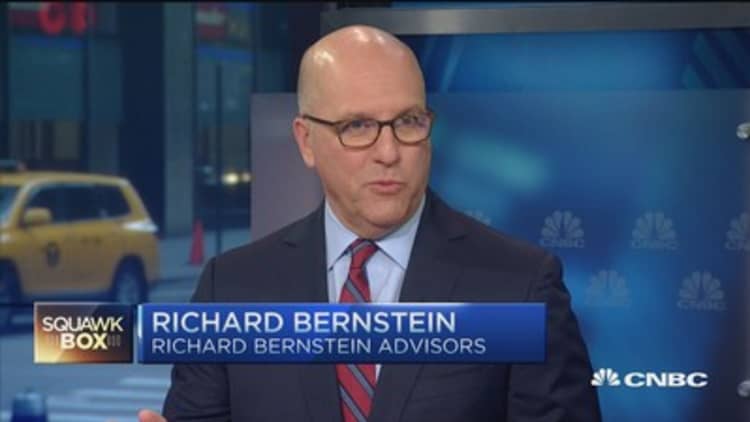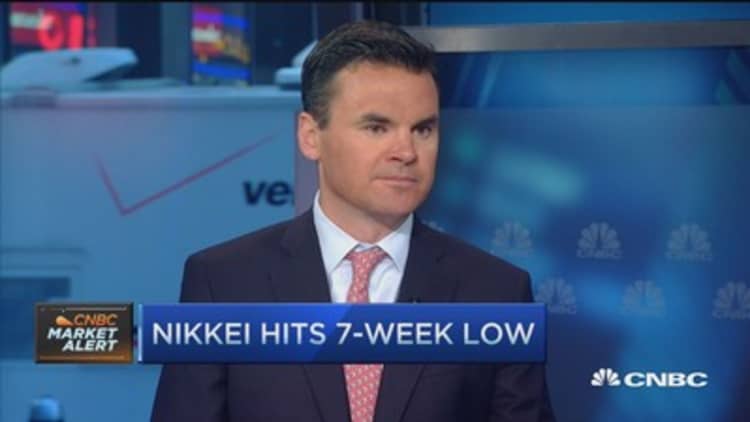
The creditors in Greece's debt drama are repeating past mistakes by assuming they can avoid unforeseen consequences should a Grexit come to pass, strategist Komal S. Sri-Kumar said Wednesday.
The president of Sri-Kumar Global Strategies said the U.S. government, Treasury and Federal Reserve thought they had Lehman Brothers' collapse under control. Recent comments by European Commission President Jean-Claude Juncker that Europe has a clear scenario for Greece's exit from the 19-nation euro zone echo the U.S. sentiment in 2008 at the onset the financial crisis, Sri-Kumar said.
"You just do not have a scenario for exit because you don't know where the pieces are going to fall once things simply fall apart," he told CNBC's "Squawk Box."
Read More Greece asks for third bailout, pledges reforms
The difference between now and then is the debt is held not by private commercial banks, but government institutions unwilling to take a haircut, he said. At the same time, Greek Prime Minister Alexis Tsipras' hand has been strengthened following a "no" vote by Greeks on the terms of a new bailout, he added.
Greeks rejected European creditors' proposal for further austerity in a referendum Sunday, signaling they are unwilling to continue on a path that has dovetailed with a 25 percent contraction in Greece's economy.
"If you say to the people in the country, 'Would you tighten your belt further so that that banker sitting in Frankfurt, London or New York can increase his or her bonus?' It's not going to get a sympathetic response from citizens, and that's the problem we are in right now," Sri-Kumar said.
"When you put it all together, if there were a Grexit, people will start to say if the Europeans can push Greece out, what does it take to push out Portugal or Spain or even Italy?" Sri-Kumar said. "U.S. equities, U.S. markets should be very, very concerned about what is going on."
Read More Why Germany won't back down on Greece: Ex-Fed's Fisher
Richard Bernstein, CEO of Richard Bernstein Advisors, took the opposite view, saying the United States would "feast on the world's problems" as low commodity prices and interest rates boost the economy.
Unlike the collapse of Lehman Brothers, which came suddenly, the world is squarely focused on problems in Greece and China, where the stock market is sinking, he said.
China may enter a period of hardship, but that could open an opportunity for neighbors like South Korea and Japan to pick up market share with U.S. businesses, he said.

Bespoke Investment Group co-founder Paul Hickey also said that while China's Shanghai Composite is in free fall, American investors shouldn't be overly concerned.
The reason: the Shanghai composite is one of the least correlated indexes in the world, and despite the stock slide wiping out about $3 trillion in wealth, the Chinese economy won't collapse, according to Hickey.
"The Chinese stock market wasn't reflective of the economy at all in the last two years, so right now I don't think this decline in the Shanghai is saying something's really afoot in China and it's collapsing underneath the surface," he told "Squawk Box."
The Shanghai Composite has fallen more than 30 percent from its mid-June peak amid frequent bouts of extreme volatility and analysts say the turbulence is starting to unnerve regional investors.
Read MoreAsian stocks sink as China, Greece fears rattle investors
The benchmark fell another 6 percent Wednesday. Japan's Nikkei also fell to a seven-week low, and U.S. stocks opened sharply lower.
Market watchers should not discount the psychological effect of spiraling stocks in China, Hickey said, but he noted the dramatic run-up in equity valuations did not reflect the broader Chinese economy or foreign markets in the last two years.
"On the way down it's hard to say that this is going to have a distinctly negative impact on the U.S. market. The U.S. economy is tied to the Chinese economy, but the Chinese market, if you're outside of China you can't really have exposure to that market," he said.
Read MoreChina's retail investors give up hope as exodus intensifies
The impact on commodities, which followed Chinese stocks lower, is a short-term concern, Hickey said.
—CNBC's See Kit Tang contributed to this story.


